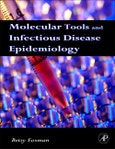Molecular Tools and Infectious Disease Epidemiology examines the opportunities and methodologic challenges in the application of modern molecular genetic and biologic techniques to infectious disease epidemiology.
The application of these techniques dramatically improves the measurement of disease and putative risk factors, increasing our ability to detect and track outbreaks, identify risk factors and detect new infectious agents. However, integration of these techniques into epidemiologic studies also poses new challenges in the design, conduct, and analysis. This book presents the key points of consideration when integrating molecular biology and epidemiology; discusses how using molecular tools in epidemiologic research affects program design and conduct; considers the ethical concerns that arise in molecular epidemiologic studies; and provides a context for understanding and interpreting scientific literature as a foundation for subsequent practical experience in the laboratory and in the field.
The book is recommended for graduate and advanced undergraduate students studying infectious disease epidemiology and molecular epidemiology; and for the epidemiologist wishing to integrate molecular techniques into his or her studies.
Table of Contents
1. Introduction and Historical Perspective 2. How Molecular Tools Enhance Epidemiologic Studies 3. Applications of Molecular Tools to Infectious Disease Epidemiology 4. A Primer of Epidemiologic Study Designs 5. A Primer of Molecular Biology 6. Molecular Tools 7. Omics Analyses in Molecular Epidemiologic Studies 8. Determining the Reliability and Validity and Interpretation of a Measure in the Study Populations 9. Designing and Implementing a Molecular Epidemiologic Study 10. Study Conduct 11. Think About Data Analysis When Planning a Study 12. Human and Animal Subject Protection, Biorepositories, Biosafety Considerations, and Professional Ethics 13 Future Directions








